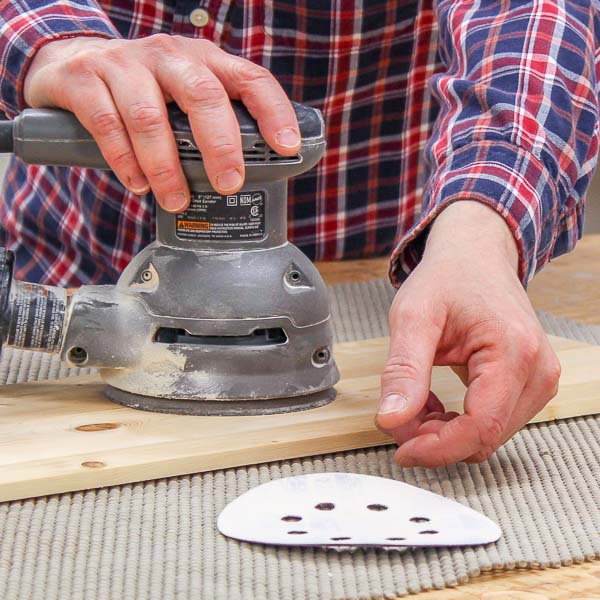If you’ve ever used an orbital sander, you might have experienced the frustration of it constantly stopping. It can be really annoying, especially when you’re in the middle of a project and just want to get it done. So, why does your orbital sander keep stopping? Well, let’s dive in and find out!
Firstly, it’s important to understand that orbital sanders have a built-in safety feature that causes them to stop spinning when too much pressure is applied. This is to prevent the sander from damaging the workpiece or causing injury. So, if your sander keeps stopping, it could be because you’re pushing down too hard.
Another possible reason for your sander stopping is that the sandpaper is worn out or incorrectly installed. Over time, the sandpaper on your sander can become worn or clogged with dust, which can make it less effective and cause the sander to stop spinning. Additionally, if the sandpaper is not properly attached to the sander’s pad, it can cause the sander to halt unexpectedly.
Now that we have a better understanding of why your orbital sander keeps stopping, we can explore some troubleshooting tips and solutions to help you overcome this issue. So, let’s roll up our sleeves and get your sander back in action!

Why Does My Orbital Sander Keep Stopping? Troubleshooting Tips to Keep Your Sander Running Smoothly
Are you frustrated with your orbital sander constantly stopping? Don’t worry, you’re not alone. Many woodworkers and DIY enthusiasts experience this issue, and it can be quite a nuisance. But fear not, as we have compiled a comprehensive guide to help you troubleshoot and fix this problem. In this article, we will explore the common causes of a sander that keeps stopping and provide you with practical solutions to keep your sander running smoothly.
Causes of an Orbital Sander Stopping
Before we dive into the troubleshooting tips, let’s first understand the potential causes behind your orbital sander stopping unexpectedly. These causes can range from simple fixes to more complex issues, but with a little know-how, you’ll be able to identify and resolve the problem. Here are the most common causes:
Dust Buildup in the Sander
Dust buildup is a common culprit when it comes to a sander that keeps stopping. As you sand, sawdust and debris can accumulate in the dust collection bag or filter, reducing the airflow and causing the sander to overheat. This can result in the sander shutting down intermittently to protect itself from damage. To fix this, make sure to regularly clean the dust collection system and clear any blockages. If your sander has an attached dust bag, empty it frequently during use to maintain optimal airflow.
If you notice that the problem persists even after cleaning the dust collection system, the issue might lie in the motor. A worn-out motor can overheat quickly, causing the sander to shut down frequently. In such cases, it’s best to consult a professional for repair or consider replacing the sander if the cost of repair outweighs the value of the tool.
Faulty Power Cord or Plug
If your sander keeps stopping, it’s worth inspecting the power cord and plug for any damage or loose connections. A faulty power cord can disrupt the power supply to the sander, leading to intermittent power interruptions. Replace the power cord if you notice any fraying, exposed wires, or loose connections. Additionally, check the outlet or power source to ensure it’s functioning correctly. If the issue persists, consider using a different outlet or consult an electrician to inspect the electrical system in your workshop.
Inadequate Power Supply
In some cases, your orbital sander may stop because it’s not receiving sufficient power. If you’re using an extension cord or a power source that is unable to provide the necessary amperage, the sander may struggle to operate smoothly. To remedy this, ensure you’re using an extension cord with the correct gauge and length to accommodate the power requirements of your sander. Refer to the manufacturer’s guidelines for the appropriate extension cord specifications, and avoid using multiple power tools on the same circuit to prevent overloading.
Additional Tips for a Smooth Sander Experience
Now that we’ve covered the common causes of a sander that keeps stopping, let’s explore a few additional tips to ensure a smooth experience with your orbital sander:
Regular Maintenance
Prevention is key when it comes to keeping your sander in optimal condition. Regularly clean the sander’s dust collection system, change sandpaper when it becomes worn, and lubricate moving parts as recommended by the manufacturer. By incorporating these maintenance practices into your routine, you can minimize the chances of your sander encountering issues.
Proper Sanding Technique
Using your sander correctly can also contribute to its overall performance. Apply even pressure and let the sander do the work, avoiding excessive force or pushing the tool too hard. Remember to follow the grain of the wood and keep the sander moving in a controlled, steady motion to prevent overheating and unnecessary strain on the motor.
Invest in a Quality Sander
Finally, investing in a high-quality orbital sander can significantly reduce the chances of it constantly stopping. Research different brands and models, read customer reviews, and choose a sander known for its reliability and durability. While it may require a larger upfront investment, a quality sander will save you time, frustration, and potentially money in the long run.
By implementing these troubleshooting tips and practicing proper maintenance, you’ll be able to overcome the issue of your orbital sander stopping and enjoy smooth sanding sessions. Remember to identify the specific cause of the problem before attempting any repairs or replacements, and don’t hesitate to seek professional assistance if needed. Happy sanding!
Key Takeaways:
- Your orbital sander may keep stopping due to a clogged dust collection bag or filter.
- The sandpaper on your sander might be worn out or not properly attached.
- Excess pressure applied to the sander can cause it to stop.
- The motor of your sander may be overheating, leading to automatic shut off.
- A faulty power supply or wiring can also cause intermittent stopping of the sander.
Frequently Asked Questions
If you’re experiencing frequent stops with your orbital sander, we understand how frustrating it can be. To help you get back to your project with minimal interruption, we’ve compiled some common questions and answers on this issue. Let’s delve into the reasons behind your orbital sander stopping and how to troubleshoot it.
1. What could be causing my orbital sander to keep stopping?
There are a few possible reasons for your orbital sander to keep stopping. Firstly, check if the sandpaper is properly attached. Loose or torn sandpaper can cause irregular movement and lead to frequent stops. Additionally, the speed setting on your sander may be too high, causing it to bog down and shut off. Lastly, a blockage in the dust collection system or a clogged dust bag can impair the proper functioning of your sander, prompting it to stop.
If none of these issues seem to be the cause, it’s advisable to check for any mechanical problems such as a worn-out motor or faulty wiring. In such cases, it may be best to consult a professional or contact the manufacturer for assistance.
2. How can I fix my orbital sander that keeps stopping due to loose sandpaper?
If your orbital sander is frequently stopping due to loose sandpaper, the first step is to ensure the sandpaper is properly attached. Open your sander’s clamps or release mechanism, remove any remnants of old sandpaper, and securely fasten the new sheet. Make sure the sandpaper is aligned straight and flat on the pad before tightening the clamps.
If the issue persists, you may need to double-check the size compatibility of the sandpaper with your sander. Using sandpaper that is too large or small for your sander’s pad can result in uneven attachment and cause the sander to stop intermittently. Choosing the correct size sandpaper and properly securing it should resolve this problem.
3. What should I do if my orbital sander keeps stopping due to high speed settings?
If your orbital sander keeps stopping due to the speed setting being too high, you should lower it to a suitable level. Higher speeds generate more friction between the sandpaper and the work surface, which can cause the motor to overload and the sander to stop. Experiment with gradually decreasing the speed until you find a setting that allows for smooth and uninterrupted sanding.
It’s important to note that the optimal speed may vary depending on the type of material you’re sanding. So, it’s a good idea to start at a lower speed and gradually increase it while assessing the performance of the sander. By using an appropriate and manageable speed, you should be able to prevent your orbital sander from stopping unexpectedly.
4. What steps can I take if my orbital sander keeps stopping due to a blockage in the dust collection system?
If your orbital sander frequently stops due to a blockage in the dust collection system, start by turning off and unplugging the sander. Remove the dust bag or canister and check for any clogs or obstructions. Use a brush or compressed air to clean out any accumulated dust or debris. Once the dust collection system is clear, reattach the bag or canister securely and ensure it is properly aligned.
Regular maintenance of the dust collection system is beneficial, as it prevents debris buildup that can hinder the sander’s performance. It’s also advisable to empty the dust bag or canister regularly during sanding sessions to avoid overloading the system. By keeping the dust collection system clean and unobstructed, your orbital sander should operate smoothly without frequent stops.
5. What should I do if my orbital sander keeps stopping despite troubleshooting?
If you’ve followed the aforementioned troubleshooting steps and your orbital sander keeps stopping, it may be indicative of a deeper mechanical problem. In such cases, it’s recommended to contact the manufacturer’s customer support or consult a professional tool repair technician. They will have the expertise to diagnose and resolve any internal issues that may be causing your sander to stop frequently.
Remember to have your sander’s model and serial number handy when reaching out for assistance. This information can help the professionals provide accurate guidance tailored to your specific model of orbital sander. Avoid attempting intricate repairs yourself, as it may cause further damage to the sander or even pose a safety risk.

Broken Orbital Sander | Try This Quick Fix
Summary
So, why does your orbital sander keep stopping? There could be a few reasons. First, check the power source and make sure it’s properly connected. Next, inspect the sanding pad and replace it if it’s worn out. Lastly, make sure you’re not putting too much pressure on the sander, as this can cause it to stop. Remember, always follow the manufacturer’s instructions and take care of your tools to keep them working smoothly!
In conclusion, troubleshooting a stopping orbital sander involves checking the power source, inspecting the sanding pad, and being mindful of the pressure applied. By following these steps, you can keep your sander running smoothly and enjoy all your future woodworking projects!